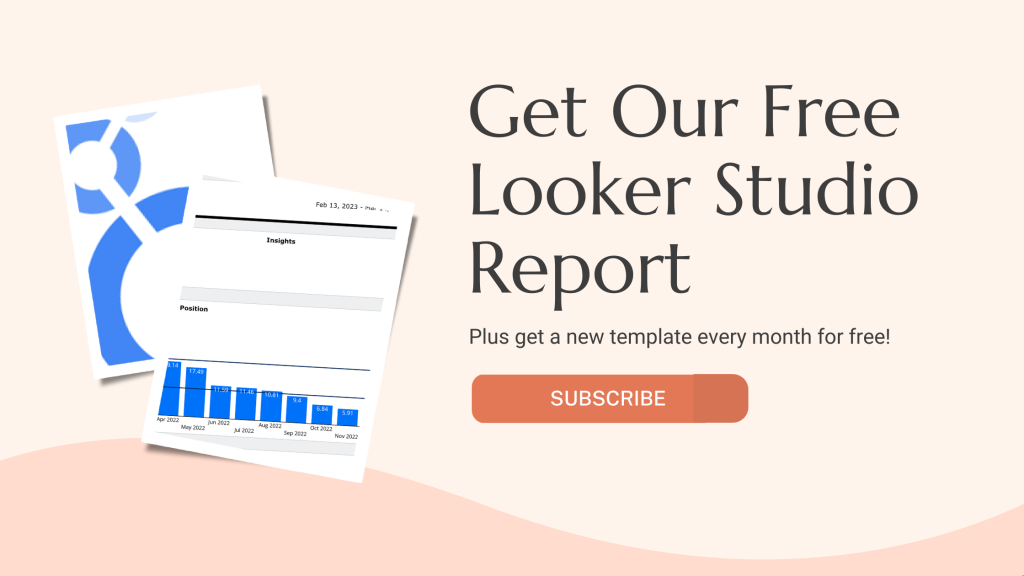Creating a comprehensive SEO report can be an arduous task for any digital marketer. An SEO report template will help you build a repeatable process you can use to gather important metrics and data that will allow you to accurately track your SEO performance.

In this article, we’ll provide some examples of an effective SEO report template so that you can better understand how to structure your own. We’ll also explain why an SEO report template is necessary and what kind of data should be included in it.
Table of Contents
Key Insights
- A ready-to-use template helps improve the consistency of your reporting process and reduces the time spent on setting up a report from scratch.
- Having a consistent structure to your reports allows you to tell the story of what is happening and come up with a plan for where to improve.
- It is critical to define what a conversion is to your business and that conversion metric should be featured prominently in your reports. We also like to look at organic traffic and impressions as additional KPIs.
- There are many tools out there that help you create reports, our favorite is Looker Studio.
What Is an SEO Report Template?
An SEO report template is a document that outlines the key metrics and data points that you need to collect in order to track your organic search performance. It typically includes information such as keyword rankings, organic traffic, link building metrics and more. By having a template to follow, you can quickly and easily track the performance of your SEO efforts.

Why Use a Monthly SEO Report Template?
Utilizing a monthly SEO report template has several advantages that can significantly improve your SEO performance tracking.
- Repeatability/Consistency: Having a pre-set structure ensures that each report follows the same format, making it easier to compare metrics across different periods. This provides a consistent framework and eliminates the chance of missing out on important data points in your analysis.
- Time Savings: A ready-to-use template reduces the time spent on setting up a report from scratch. You can simply update your metrics each month, allowing you to focus more on analyzing the data and implementing strategic changes.
- Ease of Use and Finding Data You Care About: A well-structured SEO report template helps you quickly locate the specific data you’re interested in. This not only simplifies your task but also makes your data more transparent and easy to understand, which is crucial when presenting your findings to stakeholders or clients.
A monthly SEO report template provides an efficient and systematic way to monitor and evaluate your SEO efforts. By incorporating these templates into your reporting routine, you can maintain consistency, save time, and easily track your most pertinent data.
Structure of the Ideal SEO Report
In the following sections, we will delve into particular examples of SEO report templates and how they can be beneficial for your business. We will also explore how to customize these templates to reflect the unique needs and goals of your SEO campaign.
Let’s dive in to create more effective, efficient, and insightful SEO reports.
Summary & Introduction to Overall Website KPI Trends
In the scope of SEO reporting, it’s essential to gauge the overall website Key Performance Indicators (KPIs) trends. These may include metrics such as site visits, bounce rates, session duration, and pages per session, which provide a broad view of your website’s performance.
Organic Specific KPI Trends
The organic sector-specific KPIs delve into the performance of your content in organic search. These KPIs often include organic traffic, the organic click-through rate (CTR), and the number of new organic users. Monitoring these trends can help you understand your website’s visibility in search engines and how effectively your SEO strategies are attracting organic visitors.
Top Pages
Analysis of your top-performing pages provides insight into which sections of your website are yielding the best results. This can be determined by factors like the number of page views, time spent on the page, and conversions.
Target Keyword Performance
Target keyword performance measures how well your chosen keywords are ranking in search engine results. It helps identify whether your SEO efforts are paying off in relation to your chosen keywords.
Optimized Page Performance
Assessing the optimized page performance involves tracking the changes in rankings for pages that have been specifically optimized for SEO. Key metrics here include organic traffic, bounce rate, and conversion rate.
New Content Performance
Evaluating new content performance allows you to determine how well your recently published content is performing in terms of attracting and engaging visitors.
Growth Opportunities & Next Steps
And finally, an effective SEO report should include a section on growth opportunities and next steps. This involves identifying areas of your SEO strategy that hold potential for improvement, outlining the next steps for enhancing your SEO performance based on the insights gained from the report.
Data Sources You Need for the Best Report Templates
To compile the most comprehensive and insightful SEO reports, there are specific data sources that you cannot overlook:
Critical Data Sources
GA4 (Google Analytics 4): This tool is crucial for tracking metrics like user interactions with your website, user demographics, and sources of web traffic. Using GA4 for SEO provides a wealth of information that can help identify areas of success and areas that may require optimization.
Google Search Console: Another indispensable tool, Google Search Console, gives you insights into how Google’s search bots view your website. It can help you understand how well your site is performing in search, which pages are being indexed, what keywords your site is ranking for, and much more.
Nice to Have Data Sources
SEMrush or Ahrefs: These SEO tools can provide useful insights such as keyword rankings, backlink profiles, competitor analysis, and more. While not critical, they can supplement your primary data sources and provide more granular insights.
Google Business: If you are a local business, Google Business can provide insights into how your business is performing in local search.
Keyword Hero: This tool can help identify which keywords are driving traffic to your site, giving you valuable insights to inform your SEO strategy.
Each of these sources provides unique insights and can be instrumental in creating the most accurate and useful SEO reports. By leveraging them, you can ensure a well-rounded understanding of your SEO performance and how to improve it.
Metrics & KPIs to Include In Your SEO Report
When creating your SEO report, there are several key metrics and KPIs to include:
- Conversions (GA4): This metric denotes how well your website is driving users to take your desired action. A conversion could be a product purchase, a signup for a newsletter, or a demo request form submission, depending on your business goals. It’s critical you define what a conversion is to you and then track that as one of your primary KPIs.
- Sessions (GA4): Sessions are a good way to gauge overall traffic to your website. For a GA4 SEO dashboard, we filter sessions to only look at sessions from organic search.
- Impressions (GSC): Impressions in Google Search Console represent how often your website appears in search results. This can help you understand the visibility of your website on the search engine result pages (SERPs).
- Non-brand clicks (GSC): These are the clicks you receive from search queries that do not mention your brand name. Tracking non-brand clicks can help you understand how effective your SEO strategies are in attracting users who are not already familiar with your brand.
- Brand clicks (GSC): On the other hand, brand clicks are those that come from search queries that do include your brand name. Monitoring brand clicks can give you insights into brand awareness and loyalty among your audience.
- Quantity of Keywords on the first page (GSC): This metric requires creating some formulas in a Google Sheet or Looker Studio but it’s a great way to guage if your overall keyword visibility is improving or declining over time.
Each of these metrics provides a different perspective on your SEO performance and together, they provide a comprehensive view of your website’s effectiveness in both attracting and engaging visitors.
Example of the Ideal SEO Report & a Free Template
Download a copy of our easy-to-use SEO report template. Specifically designed to streamline your reporting process, it includes all the crucial metrics and KPIs mentioned above, providing you with a comprehensive overview of your SEO performance
The template is fully customizable, allowing you to tailor it to your specific needs and objectives. It ensures that you effectively track your SEO progress and make data-driven decisions to optimize your strategy. Click on the image below to download our free SEO report template and start analyzing your SEO performance more efficiently and effectively today!

Best Tools to Create SEO Reports
There are several tools available that can aid in the creation of comprehensive SEO reports. These tools can help you build an automated SEO report and save you time and resources each month.
Looker Studio: A data platform that makes it easy to create, share, and explore data-driven insights. With Looker, you can visualize your SEO data in a user-friendly format, making it easy to understand and share with your team or clients.
Databox: A data visualization tool that pulls all your data into one place so you can track performance and discover insights in real-time. Databox can connect with many data sources, providing a comprehensive view of your SEO data and enabling you to build beautiful, interactive reports.
Google Sheets: This is an excellent tool for creating SEO reports, thanks to its simplicity and versatility. It allows you to easily import data from various sources a google sheet, create charts and graphs to visualize your SEO metrics, and share your reports with stakeholders.
Google Slides: Ideal for presenting your SEO reports in meetings or webinars. Google Slides allows you to compile your data in an organized, easy-to-understand manner, and its collaboration features make it easy for teams to work together on report creation.
Remember, the choice of tools depends on your specific requirements, the complexity of your SEO data, and your comfort level with the tool. Combining these tools can often result in the most comprehensive and insightful SEO reports.
SEO Reporting Managed Services
At Exponential Growth, we understand that creating SEO reports can be a time-consuming and complex process. This is where we step in. Our expert reporting and insights team takes over your client reporting process, handling everything from data collection, analysis, to report generation.
By leveraging our skills and SEO services, you not only get comprehensive and insightful SEO reports but also reclaim valuable time and resources that you can invest in other critical areas of your business.
Take Action Today!
An effective SEO report template is not just a luxury, but a necessity to increase client retention or get buy-in from your leadership team. Delving deep into your SEO data, understanding it, and making strategic decisions based on it is what sets successful businesses apart. Our free monthly SEO report template is the perfect starting point.
If you don’t want to do it yourself and want a done-for-you option, our reporting team at Exponential Growth is ready to step in. Contact us today to get started.

About The Author
John has spent close to a decade working with marketing agencies in various roles and capacities. Over that time he developed a passion for building systems and processes that allow agencies to improve their service offerings and deliver their service more efficiently.
